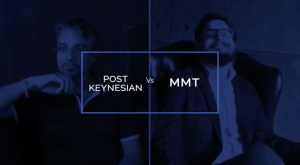MMT critics jumping the shark I was sent two papers by Thomas Palley the other day. I have known him for decades. He continually disappoints. He has become one of those self-styled Post Keynesians who are trying to destroy the credibility of Modern Monetary Theory (MMT) for reasons that are not entirely clear … He definitely has a set on MMT and regularly recycles the same sorts of attacks, which, continue to have the same problems. In other words, he does...
Read More »Yours truly i MMT intervju
Yours truly i MMT intervju Flamman (F): Först och främst, vad är MMT? Lars Pålsson Syll (LPS): I grunden är det en reaktion på sättet som pengar och hur de skapas beskrivs i den traditionella ekonomiska litteraturen. Där beskrivs pengar som något som man sparar genom att sätta in dem på banken, och som banken i sin tur kan låna ut genom att skapa krediter. Bankernas pengaskapande förutsätter alltså att privata individer sparar. Men den idén är fullständigt...
Read More »MMT — building on Post-Keynesian foundations
MMT — building on Post-Keynesian foundations To be sure, MMT concedes that the ability of an endogenous money supply to constrain inflation has limits. Government spending can still run up against the scarcity of real resources. Although some progressives invoking MMT seem unaware of this, Wray readily acknowledges that “just because the government can afford to spend does not mean government ought to spend more.” Government “must weigh the consequences in...
Read More »Skyll inte på Riksbanken. Skyll på Magdalena Andersson!
Skyll inte på Riksbanken. Skyll på Magdalena Andersson! Riksbanken har på senare tid fått utstå mycket kritik. Den har anklagats för att sänkt den svenska kronan i botten, skapat riskabelt hög privat skuldsättning och spätt på den ekonomiska ojämlikheten. Kritiken belyser visserligen allvarliga problem som delvis orsakats av Riksbankens expansiva penningpolitik, men är ändå missriktad. Riksbanken har bara gjort sitt bästa för att styra mot sitt lagstadgade...
Read More »Moneta Fiscale in Italia
Moneta Fiscale in Italia L’economia italiana sicuramente soffre anche di altri problemi. La crescita della produttività è irrisoria da vent’anni a questa parte. Ma di nuovo, almeno in parte questo nasce dalla depressione della domanda. In termini reali, gli investimenti sono stati inferiori di oltre il quindici per cento nel 2018 rispetto al 2007. La bassa domanda del settore privato, le restrizioni alla spesa pubblica, e il basso impiego della capacità...
Read More »Functional finance — how to cope with inflation
Functional finance — how to cope with inflation Less well worked out is a technique of dealing with the other responsibility of the creator of money – the responsibility for maintaining its value. The key points here are not in the direct supply of money, or even in the regulation of the level of spending. The key points are in the determination of wage rates and in the determination of rates of markup of selling prices over costs … Higher wages...
Read More »Peter Dorman — Economics, the Realm of Money and the Significance of GDP Growth, with an Application to Child Labor
Peter Dorman reflects broadly on what economics is about. Worth considering, although it is only tangentially relevant to MMT as a school of monetary economics. But it does bring up key questions that extend from philosophy to sociology, anthropology, history, and political science, as well as economics. Economies are embedded in societies as their material provisioning mechanism. In doing economics the way it is usually done, it is easy to loose a lot of this, especially in focusing on...
Read More »Does MMT — really — ignore expectations?
Does MMT — really — ignore expectations? In his latest diatribe against MMT, Thomas Palley argues that there is an “inflationary bias” in MMT, that its framework “is static and has little to say about how policy affects expectations of the future,” “is silent on asset price formation,” and “ignores expectations and treats private markets as irrelevant.” Hmmm … Yours truly has to confess it is extremely difficult to recognize that description. Given its...
Read More »IPA’s weekly links
Guest post by Jeff Mosenkis of Innovations for Poverty Action A wonderful back and forth between David Evans and DFID Deputy Chief Economist Nick Lea, ostensibly about regressions, but to me resonated more broadly on methods. Papers seem to have to need the magical pixie dust of a regression to get accepted for publication, but is it the case that every problem in development is a nail waiting for a regression hammer? Lea wonders if methods are constraining the kinds of questions economists...
Read More »MMT and trade deficits
MMT and trade deficits Unlike government deficits, which all countries in the world can run simultaneously, a trade deficit for one country necessarily means an equivalent trade surplus for the rest of the world. If there are countries deliberately running trade deficits, then they are forcing others to run trade surpluses. Since on this MMT argument, the trade deficit countries are the winners and the trade surplus countries are the losers, the former are...
Read More » Heterodox
Heterodox






